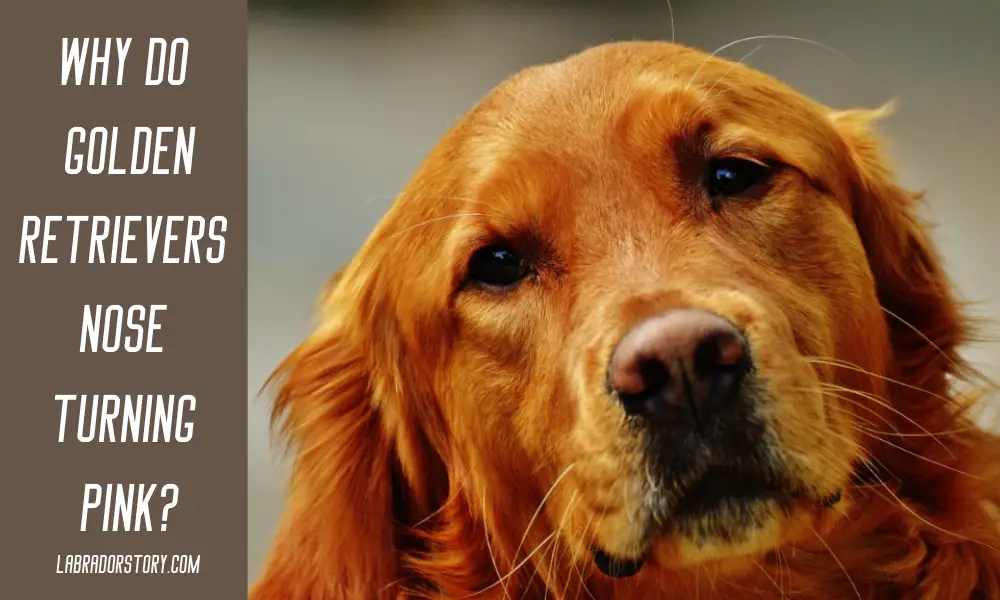Last Updated on November 28, 2023 by Linda Richard
While it is highly satisfying to boot your Golden Retriever’s nose, you may observe the appearance of a pink nose or darker brown patches on their nose. As a result, you may begin to wonder about the cause behind this change in color.
There are several reasons why do Golden retriever’s nose turning pink or light brown, including pigment loss, allergic reaction, sunburn, underlying health issues, and genetic factors. Pigment loss can occur as the dog ages, while sunburn can affect those with light-colored noses.
A Golden Retrievers pink nose may also be a sign of health problems, such as autoimmune disorders or hormonal imbalances. Additionally, some Golden retrievers nose may be born with a pink as a result of genetics, similar to how coat colors can vary among dogs.
If you observe any alterations in your canine’s nose hue, consulting a vet is imperative. “Winter nose” or hypopigmentation can transpire in Golden Retrievers, causing them pink nose or brown. Initially thought to only occur during winter, it can happen throughout the year.
Unless the dog is suffering from issues like itching, scaling, crusting, or bleeding, there is no need to worry. To gain an understanding of Golden Retrievers’ pink noses, read on as we will discuss all facets of the condition and clarify red flags that warrant veterinary attention.

Table of Contents
Can Golden Retrievers get a “winter nose”?
Golden retrievers may experience a condition in cold weather when the Golden Retriever’s nose may turn paler, lighter, or duller.
This condition in a Golden Retriever nose is called “snow nose” and is not considered dangerous for your pet.
As the weather gets warmer, the Golden Retriever nose pigmentation typically returns to its normal shade. Nevertheless, if the paleness or discoloration of your Golden Retriever nose persists even in summer, it is advisable to seek advice from a veterinarian since a snow nose might indicate an underlying ailment that necessitates treatment.
The reasons for the appearance of a winter nose in pets
Snow nose, which is also identified as winter nose or Dudley’s nose, is a purely aesthetic issue that results in the noses of particular Golden Retrievers losing the pigment and changing in color to pink or light brown, or dark pigment when winter arrives.
Retviver Golden’s nose exact cause of snow noses is not fully understood, but it is believed to be a combination of genetic and environmental factors.
Some researchers speculate that cold temperatures and decreased exposure to sunlight during winter months may contribute to the loss of color in a Golden Retriever’s nose.
However, there are other opinions from some experts who believe that the appearance of a “snow nose” in dogs is not such a harmless phenomenon and is associated with such disorders as a reduction in the production of melatonin, a hormonal imbalance that regulates skin pigmentation.
Even though the phenomenon of “snow nose” in Golden Retrievers is not life-threatening for the dog, measures must be taken to protect the animal, for example, not to walk for a long time in winter conditions or to provide a warm shelter for the dog.
Moreover, it is crucial to seek advice from your veterinarian to eliminate any potential underlying health problems if you detect any abnormal alterations in your dog’s nose’s appearance or texture.
How to treat your dog with a winter nose?
Winter nose, alternatively referred to as winter Golden Retriever nose or hypopigmentation, is a state wherein a dog’s nose transforms from black or brown to a pink or light brown hue.
This condition is more common in breeds with dark fur and is believed to be caused by a decrease in the production of melanin.
Snow Golden Retrievers noses are not painful nor a severe condition, so treatment is not necessary.
However, there are some things you can do to keep your Golden Retriever comfortable during the winter season:
- Protect the Golden Retrievers noses from the cold. As the nose loses its pigmentation, it also loses some of its protection against the cold. It is important to prevent snow nose.That’s why you need to be cautious and protect Golden Retrievers noses from the cold, otherwise, your dog’s nose may crack and become dry.
- It is recommended to stay out of the sun to protect dogs with snow nose from sunburn as they are more vulnerable to it.
- Provide a balanced diet. A balanced diet rich in nutrients can help to promote healthy skin and fur. Talk to a veterinarian or dog nutritionist about the best diet for your Golden Retriever.
- Having your dog regularly examined by a veterinarian can aid in uncovering any hidden health issues that could be contributing to the snow nose. There are instances where snow nose can indicate a more serious health concern.
Should a snowy nose be a reason for worry?
Don’t be worried if you have a Golden Retriever and notice that its nose alters hue during the winter months. Nonetheless, it’s advisable to keep track of your pet’s well-being and seek advice from a vet if you have any worries.
Is it possible to prevent a snowy nose?
Golden Retrievers commonly experience dog snow nose, which usually arises during the cold winter season. Though there is no surefire way to prevent the onset of a dog’s snow nose, you can take certain steps to lessen its severity, such as:
- Limiting the exposure to the cold, especially during the colder times of the day.
- Making sure that your Golden Retriever’s nose is always moisturized, by applying a dog-safe moisturizer to the nose.
- Supplementing your Golden Retriever’s diet with Omega-3 and fatty acids can help improve overall skin health and prevent dryness.
- Avoiding areas where the ground and snow are likely to reflect the sunlight and cause glare, as it has been known to trigger snow’s noses.
Will sunscreen help to dog’s nose?
Yes, Golden Retrievers noses do need sunscreen. Just like humans, dogs can also get sunburned and develop skin cancer.
Areas that are exposed and have less fur such as the nose, ears, and belly are at high risk for sun damage.
One can use sunscreen specifically designed for dogs and apply it 20-30 minutes before going outside to prevent the noses turn pink.
Serious illnesses can cause a pink nose
There are indeed certain serious health issue that can cause a Golden Retriever’s nose to turn pink depending on the dog breeds.
One common cause is an autoimmune disease called Discoid Lupus Erythematosus (DLE). This condition affects the skin and can turn pink or brown discoloration on the nose. DLE can also cause lesions, scabs, and crusts on the nose.
Another possible cause is a fungal infection. Fungal infections can also cause discoloration on the nose and nose turn pink, as well as other symptoms such as itching, scaling, and hair loss.
Nasal solar dermatitis, also known as “Collie’s nose,” is another condition the nose turn pink that can cause a pink or brown nose.
Nasal solar dermatitis is caused by exposure to sunlight and can cause skin damage, inflammation, and turn pink nose.
If you use a plastic bowl for your dog’s food and drink, the change in the color of the nose might be caused by a reaction to the plastic.
There are also genetic factors that can turn pink or brown nose in Golden Retrievers.
If you notice any changes in your Golden Retriever’s color or nose or nose’s texture, it is important to have them evaluated by a veterinarian.

FAQ
Will my Golden Retriever nose turn black again?
Golden Retriever puppies often have pink noses or are lighter in color, but as they grow older, the color of the noses may darken. The darkening of your Golden Retriever’s nose could be a natural result of the Golden Retriever ages.
If any alterations in your Golden Retriever’s noses appearance bother you, and its nose turns pink it is advisable to seek advice from a veterinary specialist.
Why is my Golden Retrievers nose pink and not black?
There are several possible reasons that a Golden Retriever’s nose turns pink instead of black. One common reason is genetics, as some Golden Retrievers are bred with lighter pigmentation in their noses.
Additionally, certain health conditions or medication use can cause changes in pigmentation, if the nose turns pink. It is important to discuss any concerns with a veterinarian to ensure proper diagnosis and treatment.
What does it mean when a dog’s nose is turning pink?
A dog’s nose can sometimes turn pink nose as they age or due to genetics. It can also be a sign of certain medical conditions, such as an autoimmune disorder or an infection.
Therefore, if you notice a sudden or unusual change in your dog’s nose color, it is best to consult with a veterinarian for a proper diagnosis and treatment plan.
How do I stop my dog’s nose from turning pink?
Here are a few reasons and ways how to stop a dog’s pink nose:
1. Sunburn. Limit the dog’s exposure to the sun or use pet-safe sunscreen.
2. Allergies. Identify and avoid allergens that cause the dog’s nose to turn pink.
3. Infection. Consult with a veterinarian for the appropriate medication to treat the infection.
4. Diet. Ensure the dog is consuming a balanced diet that meets its nutritional requirements.
5.Contact dermatitis. Avoid using any harsh chemicals, and use pet-safe soaps, shampoos, and cleaning agents.
Conclusions
The color change of the nose depends on what dog breed your dog is.
In normal conditions, dogs should have a black nose.
However, if you live in cold climates, the color of your dog’s nose may change.
Labrador retrievers, unlike Bernese mountain dogs and Siberian huskies, which have black noses, may turn pink nose.
The main thing is to understand the cause of a problem in time and take measures. I hope this article will be helpful to you on this issue.

